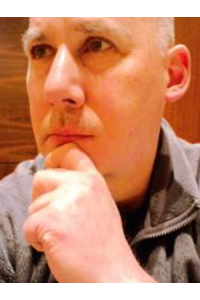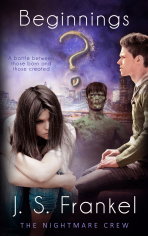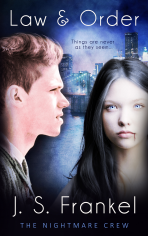The Bronx
Eleven-thirty p.m., late November
Paul Wiseman ambled into the corner grocery store, looking for trouble and hoping he wouldn’t find it. However, trouble always seemed to find him. This was New York, and trouble was its middle name. He took due note of the security camera overhead, saluted it, then continued on.
A second later, though, he stopped as he caught sight of his face in the reflection of a glass case. An image of a teenager just a few months past his eighteenth birthday stared back at him. It was doubtful anyone would ever consider him imposing in terms of height, as he stood only five-seven. He wasn’t overly muscular. Instead, he had a lean and hungry look about him.
Wardrobe-wise, again, he wore nothing special, only jeans and a long-sleeved shirt. Coats weren’t for him, and he wouldn’t have felt comfortable in anything save bare feet. Although it was frigid out, the cold had ceased to bother him a long time ago.
Mentally, he made a list of things that stood out, and the only word that came to mind was unremarkable. Clothes? No. Physique? Not really—I’m average in every way, he wanted to shout to the world—but his mirror image said otherwise. Brown hair fell in waves around his narrow face, and he brushed it aside to reveal a pair of yellow eyes.
Right away, this marked him as different, and the immediate question anyone would have asked was, Is this real? At times he found it difficult to believe he actually looked this way, and he turned his head slowly to each side, wondering again if this was a dream or reality.
It turned out to be the latter. Moving past the yellow eyes, he gazed at his high cheekbones, the slightly elongated nose and the fur covering most of his face and his hands. It was everywhere else on his body as well. Shaving was a pain. He hated it, but it came with the territory of being a hybrid.
“Paul, don’t forget we have to go back on night duty soon,” Angela, his girlfriend, called out as she poked her head in the doorway. “You’re with me, right?”
He broke off mirror contact then turned around. “It’ll just take a couple of minutes. Hang on.”
She ducked outside again, and he watched as she lounged against the side of the shop, eyeing the surroundings lazily. A few people walked by, cursing the cold, and when they got a look at her, they quickly moved on. She paid them no attention. “I got it, boyfriend. I’ll be up top if you need me,” she leaned in to say.
With a quick leap, she sprang into the air. This was what they did, the Nightmare Crew, and while they made their home in Manhattan, tonight they were on patrol in the Bronx. Crime was always happening somewhere. Tonight was no different.
Walking just out of the door to glance up at the sky, he observed her form as she flew along. As always, she wore a black leather outfit and a matching cape, tricked out with a liner that glowed in the dark and illuminated her slender form. Black boots completed the ensemble.
She could get away with wearing a costume. For him, he thought it too comic-bookie to wear something that differed in terms of clothing. Moreover, he didn’t want anything to restrict his movements. Functionality remained a priority for him when it came to clothing.
“Yeah, we’re the Nightmare Crew,” he said to no one in particular as he walked back inside the store. He was nominally the leader, but he never forgot who the muscle in the group was.
It was Angela, no last name, a lab-synthesized vampire-girl. Young woman, really… They were roughly the same age. With a slender, sexy figure, porcelain-white skin and pretty features—including fangs—she created a sensation wherever she went. Some of it was good and some bad, but he recalled an old saying, There is no such thing as bad publicity.
Maybe there wasn’t. He didn’t know for sure. What he did know all too well was how others saw him and what they thought. Werewolf, creature, monster—he’d heard the terms before. It didn’t seem right or fair, but who said life was fair to begin with?
“Help you, sir?”
A voice spoke, startling Paul out of his day-night dream, and he turned around. A teenager, maybe sixteen, short and slight, actually jumped back once he saw the fur, and his jaw dropped about a foot. “It’s…you,” he stammered out. “I didn’t know if you were real or not, and—”
“I’m real,” Paul answered, cutting him off at the gape. “I just came in to buy something.” He reached into his back pocket and pulled out his wallet. Opening it, he showed the wad of bills he had in there. “I’m going to pay for my stuff, okay?”
The kid didn’t seem to be overly concerned with the money angle. Instead, he continued to stare, his eyes growing larger with every passing second. “Do you…eat?” he finally managed to get out.
If ever there was a time to roll one’s eyes, this was it, but Paul resisted the urge. He’d run the gamut of questions over the past few months, and by now, he’d grown tired of answering them.
‘Do you eat?’
‘How fast can you run?’
‘Do you have a girlfriend?’
Angela always blushed at that last question. They’d been dating for about a year, had grown close, yet personal questions always flustered her. They got to him as well, which was why he didn’t like answering them.
Bringing his attention back to the guy, Paul answered, “Yeah, I eat. Y’mind?”
As he began to edge his way down the aisle, the kid said, “Hey, man, I’m filling in for my father, okay? I don’t want trouble.”
Going shopping is trouble? This time, Paul heaved in a deep breath, fighting down his frustration. Determined to set a good example, he forced a smile and hoped it didn’t look too threatening. “There isn’t going to be any trouble. I’m just here to shop, then I’m going back outside. I’ll be on duty, guarding the neighborhood. Is that okay with you?”
His face white, the young kid gulped down a bagful of air. “Yeah, man, it’s cool. Just…get what you need, okay?” He turned and scurried around the counter, hanging onto the cash register.
Paul pivoted around on the ball of his foot, grabbed a basket then went into the food section to begin loading it up with assorted slices of meat, cheese and bread. Sticking to the basics in food groups remained a priority, as did checking the prices. Heroes had to eat, and not everyone was born with a silver spoon in their mouth.
Along the way, he mused about how things had come to be as they were. Raised in an orphanage and wanting nothing more than to escape its grim confines, he’d run away, gotten into trouble with a local gang, then Angela had come along at the most dramatic moment and rescued him. From there, she’d flown him to a house in upstate New York where he’d met her friends, also laboratory creations.
Ooze, a sarcastic and bright sentient water being, served as the brains of the outfit, rigging up high-powered tech devices.
Sandstorm was quiet and shy—a being made of sand who traveled over the land like a fast-moving snake. He didn’t speak. Instead, he signed his answers, and although he wasn’t much of a team player, when crunch time came, he always pitched in.
There’d been another member, CF—his name stood for Cannon Fodder—and he was a zombie, but he’d been destroyed, and they’d never been able to resurrect him.
“Resurrection,” he mumbled, as he checked out some electric shavers. Which was better, manual or electric? He decided on the former and tossed five of them in the basket.
Resurrection was the key. In his case, it was more of a transformation. His friends had been created by a scientist in a special chamber, one capable of transforming stem cells into any kind of form possible. Paul knew about the chamber all too well, as the same device had given him life after he’d been shot and almost killed. He’d emerged a hybrid of human and wolf, with all the speed, strength and ferocity of the animal, complete with fangs, but he’d retained his humanity, and—
A sound at the door disturbed his concentration. Five young men dressed in jeans and jean jackets, with tough-looking faces and hunched shoulders, strode in and made their way over to the counter. Paul instantly tensed and whispered into his intercom, a handy little device Ooze had rigged up, “Angela, we may have some trouble.”
“On my way,” she said. “Get them outside.”
She clicked off, and Paul kept out of sight behind a stack of cans, waiting for something to happen. The leader of the group, a tall, rangy youth, walked over to the counter. “My homies need a little cash. Spare any?”
“I-I can’t, man,” the teen squeaked out. “I’m gonna call the cops.”
His answer provoked a round of laughter from the leader. “Kid, you’re crazy if you think the cops are gonna help you.” He reached into his pocket to pull out a switchblade. He pressed the trigger, the blade sprang open then he brandished it in front of the kid’s face. “You mess with us and you know what you get?”
“I’d say a couple of years in jail,” Paul said, as he emerged from behind the stack of cans and put down his basket. He walked over to the punk then stopped three feet away. “You look over eighteen. If you want trouble, let’s take it outside, okay? This kid isn’t much of a threat, and I don’t feel like destroying public property.”
Immediately, the gang leader got a look in his eye, one that said, Mess with me and you get a one-way trip to the morgue. “Man, I’ll cut you. You hear me?” He swiped the air with the blade.
“Try it.”
He did, and in a lightning-fast move, Paul smacked the switchblade out of his hand. It went skittering across the floor and under a crate of tomatoes. “Got anything else?”
As if on cue, the gang members whipped out their blades but backed out, weapons held in front of them, weaving them in rough figure-eight patterns. Paul followed them onto the street and cautioned, “That’s a really bad move.”
“There’s five of us and one of you,” challenged the leader.
“Count again,” called a voice from above.
A harsh wind began to blow and it buffeted the members around. “Did I tell you that my girlfriend can control the wind?” Paul asked.
If they heard him, they didn’t answer, as they were too busy trying to fight back against something they couldn’t see—a gale force that slammed them against the wall of the grocery store then pinned them there. Angela had the power of the wind at her disposal but didn’t use it very often.
She preferred to use hand-to-hand fighting skills, and if he had to choose a word to describe her style, the only one that came to mind was wicked. Angela fought with incredible speed, fury and totally without mercy. Paul often trained with her, just to keep in shape. She always won.
“Hey, let us go!” the gang cried en masse.
A crowd of onlookers had gathered, braving the cold. “Take ’em down,” one of them yelled.
Angela ceased her attack and landed next to Paul, a smile on her face. She seemed to size them up, one by one. “So, which one of you tough guys is first?”
The gang leader looked at his friends then at her. “Me,” he said before he threw a punch.
His shot hit her directly in the jaw. She didn’t even blink, and he recoiled, holding his hand in pain. “What are you?”
In a move too fast to follow, she grabbed his collar and lifted him off the ground with ease. “I’m your nightmare come true. Stealing is wrong. Assault is worse.”
With a careless flick of her wrist, she tossed him at his friends, and they tumbled to the ground like bowling pins. Paul strode over and extended his fangs. Angela joined him and did the same. The punks recoiled, shielding their faces. “Get this straight,” Paul said. “You’re done here.”
Just then, the sound of a siren broke things up. Two police cars pulled over and four cops got out, hands on their holsters. One of them strode over, glanced at the punks on the ground and posed the question, “What’ve we got here?”
“Attempted robbery and assault,” Paul answered. “They’re all yours.”
After quickly handcuffing the punks, the police threw them into their cars. “Thanks,” muttered one of the cops. “We could have handled it.”
“If you’d shown up ten minutes earlier? Yeah, maybe,” Angela quipped, which provoked an outburst of laughter from the crowd.
Her response didn’t make the cop’s evening as he tossed her a sour look. He got back into his car and roared off with the other police car close behind. Paul turned to face the crowd. Instead of thanking them, the people backed away.
“Fangs,” Angela whispered.
Oh yeah, right. He’d forgotten to retract them. “Sorry,” he whispered back then pulled in his fangs. To the crowd, he said, “Show’s over, folks. Have a nice night.”
No one said a word, and he wondered if they understood the meaning of the word gratitude. Sighing, he walked into the store, retrieved his basket then paid for his goods. Once outside, he asked Angela, “So, are we going home?”
“I think we’ve done our good deed for tonight.” Her ice-blue eyes shone brightly.
“The police don’t seem to appreciate our help.”
It was a sore point with some of New York’s finest. As the government-established protectors of the city, naturally, they thought of themselves as being the sole purveyors of the law. They didn’t like it when a vigilante group, as certain members of the press had labeled the Nightmare Crew, took the law into their own hands and took care of business on the streets.
To make things run more smoothly, Paul and his friends had held a number of meetings with the police and eventually forged an uneasy alliance. On the surface, they got their support from the chief of police and the commissioner, but, all the same, some patrolmen thought their power was being usurped.
Angela turned to him and kissed him fondly on the cheek. “We’re doing our job. Never mind what they think of us. We’re doing the right thing.”
Offering a grunt, he decided to let it go. Tired and hungry, he wanted nothing more than to call it an evening, but knew Angela had other plans in mind. “So, what’s on the menu?”
“You know where I want to go.”
Inwardly groaning, he nodded. Dancing… She loved dancing. “There’s a Goth club not far from here,” she said then nodded at the bag he held in his hands. “I’m sure they have a refrigerator there, and you can always buy something to eat there.”
Paul hated dancing, but being with her made all the difference. He’d muddle through it. He usually did. “Okay, dancing it is.”
She grabbed his hand, and they walked along the street. Some of the passersby gave them wary looks while others hurried along. Angela noticed the stares, though, and a frown briefly crossed her face as she echoed his earlier thought. “You’d think they’d be a little more appreciative, wouldn’t you?”
Paul didn’t answer right away. The populace should have shown at least a little appreciation, but things didn’t change overnight. Right now, he wanted nothing more than to go home, but being with Angela… Well, he’d suffer through looking like a fool on the dance floor. It was a price he willingly paid. “I appreciate you,” he finally said.
“And I love you for it,” she answered with a brilliant smile sans fangs. “C’mon. The club’s just up ahead.”
Manhattan
Five minutes past midnight, December 1st
The search for bad guys continued, as it had every night from when they’d started their crime-busting efforts. Tonight they’d decided to search for crime in the biggest potential hotspot of all. Paul waited in the shadows of an alley close to Times Square and watched for trouble. Chances were it would happen soon. A light coating of snow fell, but he ignored it and focused his attention on the crowd.
In spite of the frigid temperature, the area was full of midnight revelers. Those who were partying, those who were drunk and those who simply wanted to get out and see the sights—everyone came to sample what the Big Apple had to offer. Young and old, rich and poor, they’d come here, the number one city for entertainment. It also happened to be one of the most crime-filled areas in North America.
“Here comes some trouble,” he murmured, poking his head out briefly to take in three men who were making their way down the main thoroughfare. They were dressed in jeans and tight leather jackets, and the clothes didn’t hide their overdeveloped biceps and underdeveloped triceps. They had the look of weightlifters who didn’t know balance or proportion. They only wanted to look tough.
Yeah, they were big—but he could take them. With his enhanced strength and speed, he could handle anything that came their way. He and Angela had taken on the baddest of the bad, but recently, with the exception of the night before, crime had decided to take a holiday to leave them with only small pickings. They’d busted up a few muggings, one attempted rape and had taken down two drug dealers, with nary a scratch to show for it.
Of greater concern were some happenings on the national front. The news reports had shown a series of savage killings out in the greater Los Angeles area—fifteen so far. People burned to death, ripped apart and melted. The police had no answers. The press demanded them, and the public was scared. Paul had an idea of who was behind this—an old adversary—but he didn’t dare believe his old foe had resurfaced.
Turning his mind back to the matter at hand and angling his gaze upward, he saw Angela stationed on a building a hundred feet away and two hundred feet off the ground. She favored heights, as she liked to swoop down on the unsuspecting scum that thought themselves immune from attack. As usual, she wore her leather outfit, along with her cape. He waved and got a quick wave in return.
His gaze shifted to their targets. The men kept up their walk, striding along in a lats-out pose, the favored look of many weight trainers. They moved along the road, shoving others out of their way effortlessly.
A few shocked pedestrians yelled variations on, “Hey, watch where you’re going. We’re walking here,” but the trio paid them no mind. With expressions of toughness—sneers accompanied by curled lips—they moved as if they owned the streets.
“You don’t own anything,” Paul muttered, still checking the hustle and flow of human traffic along the sidewalks.
Fortunately, no one bothered to look down the alley. Had they done so, they’d probably have screamed ‘monster’ or something of the four-letter variety. Even with his vaguely lupine features, he was human.
Or was he? Since the change, roughly a year ago when he was just about to turn eighteen, he’d been wrestling with the ‘is he or isn’t he?’ scenario. It wasn’t easy being different.
* * * *
But being different made all the difference. Once ordinary, short and weak, he’d been a resident of an orphanage where his father, now dead, had dumped him. CliffsNotes—he’d hated living there. The environment had been decidedly unfriendly. A year ago, almost to the day, he’d taken flight from the orphanage, been attacked by a gang and had been rescued by someone decidedly unusual. After a series of events too complex to mull over in his mind again, he’d gone through the transformation and become one of them.
At first it had been him, Angela, Ooze, Sandstorm and CF going off to fight crime and terrorize those who sought to terrorize others. They had been the mystery people, the ones who took down gangsters, drug dealers, petty thieves, potential rapists and more. The papers hadn’t known what to call them, then one of the more enterprising minds dubbed them the Nightmare Crew. It sounded good. It stuck and they’d soon became a force to reckon with, all four of them.
No, check that, Paul mused. The two of them, him and Angela, fought crime. Sandstorm wasn’t really a joiner, and he’d gone off on his own a few months back to live in California. He didn’t speak, but formed words with his sandy body. I want to be on my own, he’d signed at the time in a series of shifting grains. If you need me, look in Baha. I’ll be there.
Ooze controlled water, but he preferred to stay in their rented warehouse, creating new gizmos and studying the science of what they were. “Hey, I’m not much good against heat,” he’d once said. “Sunlamps just don’t do it for me. I can be of more help fixing up gadgets to protect you.”
Protection was where it was at. The problem lay in how to protect those who needed it, and who would do it? The Nightmare Crew had started out working in New York—mainly the Bronx, moved out to Los Angeles after six months, then finally, after a series of encounters against other hybrids, moved back again to New York.
There, they’d met with more suspicion than the first time around. People simply weren’t used to being rescued by those who looked different, as if they’d come out of some misbegotten horror tale. Oh, they accepted the help, but getting a ‘thank you’ proved to be a hard-won and often not achieved goal.
“They’ll never accept us,” Angela had said in despair one day. “They think we’re freaks and mutants. You know we can’t go out in the daylight without someone saying something.” She’d swiveled her head to lock eyes with Paul. “You know that.”
It was impossible to disagree with her. They’d gone out to meet the public in LA, done a few interviews, but fear and mistrust remained. “We want our city protected by the police,” many people had chanted, “not by freaks and mutants!”
Los Angeles simply hadn’t been the place to be, so they’d moved back to New York. There, Paul had gotten in touch with someone from his orphanage days. Brother Max Dickinson, who preferred to be addressed only by his first name, asked Paul in an email to meet him at an address in Manhattan, near the Bowery. It won’t take very long, the email had said. I have something to show you.
They’d driven over in their van at night. Paul had felt a little nervous at meeting his mentor again. He’d helped them when they’d had a little trouble in Los Angeles. He wondered why Max had agreed to help him so readily. “Here we are,” Ooze had said, pulling in at their destination.
It had turned out to be an abandoned warehouse. Max had stood outside the front door. He’d changed in the interim six months. Formerly a large bearlike man, Max’s physique seemed to have shriveled, and his overcoat hung loosely on his frame.
Max had nodded at everyone. “It’s good to see you all again.”
“Uh, is something wrong, sir?” Paul had asked. From the sallow skin, hollow eyes and trembling hands, he’d been able to tell that something was most definitely wrong. He hadn’t wanted to be nosy, but Max had always been a friend as well as a mentor. Saying nothing in this situation would have been rude. “I know I shouldn’t be asking you this, but—”
“Yes, I have cancer,” Max had said in a gentle way, cutting him off. “It’s pancreatic cancer. The doctors have given me six weeks at most.”
There had been nothing to say…nothing that could have been said. Ooze had stared at the ground, and Angela had immediately gotten a look of concern on her face. “Uh, is there any kind of treatment they can do for you…?” Paul had begun, but his voice had trailed off when Max had shook his head.
“Stem cell treatments, chemotherapy… They only delay the inevitable.” Max hadn’t sounded overly bothered by the fact of his impending demise. In fact, he’d sounded calm, almost too calm. “I’m ready. In the time I’ve got, I want to help, and getting you this”—he’d waved his hand at the warehouse—“is something I want to do.”
Angela had bobbed her head. “Thank you,” she’d whispered. “But why are you helping us?”
With a good deal of passion in his voice that belied his illness, Max had made it clear where he stood. “You do a lot of good in the world,” he’d answered, as he’d unlocked the door and showed them inside. The interior, stark and empty, was large enough to house approximately twenty cars. It consisted of four unadorned concrete walls, a concrete floor and overhead lighting. That had been it.
“When you first came around, I asked myself if you were good or evil. It’s my upbringing, I guess,” he’d said and had offered a somewhat self-deprecating-sounding chuckle. The chuckle had soon turned into a ratchety cough, but he’d waved off any form of assistance. “I wondered if you were demons or something unholy. But then I realized you were here to help people. I saw what you did here around a year ago. I know about what happened in Los Angeles. And when Paul contacted me, I knew he was a good young man. I wasn’t wrong.”
With an expansive gesture to indicate the room, he’d added, “This place belongs to one of the churches in the neighborhood, Saint Agnes’. It used to operate as a soup kitchen and homeless shelter, but the people in charge moved to a different place. They’ve agreed to let you use it. No strings attached.”
He’d tossed a set of keys to Paul. “Make me proud of you. I’ve always been on your side. I always will be.”
The door had closed softly behind him. “Go to him,” Angela had whispered. “He needs you.”
Paul had run out into the night to where Max had been getting into a taxi. “Sir, uh, isn’t there anything I can do?” he’d asked. “I mean, my friend Ooze… He got a lot of scientific knowledge from the scientist who created him. He might be able to help—”
Actually, he’d been thinking Ooze would be able to recreate a chamber. The chamber had the power to alter a person’s DNA and enhance their immune system and regenerative abilities. No reason why the process wouldn’t work in this case.
“No, I’ve made my decision,” Max had interrupted in a firm voice. His hands had stopped shaking as he placed them on Paul’s shoulders. “No medicine, no life extension and no changes. I know what you went through. I was given one life, here, on Earth, and I’ve always tried to help. What you have to do is to remain on the side of the angels. That’s how you help others.”
In a swift move, he’d turned away and had gotten into the taxi. The cab had roared off and Paul had stared after it, remorse flowing through him. He’d watched his father, the father he’d never really known, die from cancer not so long ago. Now the same thing was happening all over again…
A touch of a hand on his shoulder had made him start. Angela had walked around to face him, her eyes locked on his. “He cared for you,” she’d said. “He cared for all of us. You remember he visited us when we lived out West. You should go to him when you have the chance.”
“I will.”
Paul had promised himself that much. Once back inside the warehouse, he’d shelved his personal feelings and asked Ooze, “What do you need?”
“It’s going to be tough,” the answer had come. “What I need is specialized stuff, and I don’t think we’re going to find it in a dumpster.”
They’d managed to find the basics through second-hand shops. Paul had gone in and bought what they’d had to have. The shopkeepers couldn’t have handled dealing with a watery guy in a containment suit or a vampire. It’d freak them out too much. As it was, their eyes had always held wariness, trepidation mixed with fear. Still, when they’d seen the cash—courtesy of the late Dr. Bolson—they’d become slightly friendlier, but only by a little.
Furnishing the place had taken time, so between shifts of fighting crime, they’d bought furniture, as well as lengths of lumber, and they’d fashioned separate rooms. Angela had wanted her privacy, and Paul had needed his as well. Ooze had needed no special room, just a couple of buckets or access to a sink or free-flowing water supply.
However, he had needed a lab area in which to work, but with no equipment, no centrifuges, microscopes or anything else, progress had been impossible. “Guys, I need to run tests,” he’d complained. “I know it’s hard to find, but keep an eye out, will you?”
Fortune had smiled upon them one night a month after they’d moved in. Paul and Angela had arrived back shortly after midnight and found Ooze standing outside the warehouse next to five large wooden crates, each of them the size of a refrigerator. “Guess what I found? I heard a truck stop, came out to look and voilà.”
“Open them up and let’s see,” Angela had suggested.
Once they’d dragged their newfound cargo inside then opened it, they’d seen the latest in lab equipment—centrifuges, blood analyzers, electron microscopes and a DNA differentiator. Another crate had held the newest in night vision goggles, stun grenades, Tasers and more.
The last crate had held only two items—a large flat-screen television and a computer, the latest model around, with a twelve-gigabyte memory. Ooze had bubbled over with joy as he’d taken it out and lovingly caressed it with his oversized hands before setting it up. A note had been folded on top of the computer.
“What does it say?” Paul had asked.
“It’s the password,” Ooze had said then murmured, “This is Candy Land.”
“Home defense is what it is,” Angela had muttered as she’d inspected the goods, running her hand over each one of them. She’d picked up a grenade, studied it and put it down. “What are we facing, an army?”
“You heard about the killings out West?” Paul had asked. “Think our friend Peterson is still alive?”
Her eyes had flashed an icy blue. “I’m betting on it. But who’s giving us this stuff?”
“No return address,” Ooze had said as he hooked up the modem. Once done, he’d turned on the computer and began to check things out. “Yeah, this is going to help me a lot,” he’d stated with satisfaction.
If Ooze hadn’t seemed overly concerned about who’d given them their latest bounty, Paul had been. However, more important than the mysterious benefactor was who’d committed the latest string of murders. The name Peterson kept running through his mind. The former owner of Rallan, a genetics research company, Andres Peterson, a scientist and researcher in his own right, had undergone a similar mutation to Paul’s.
However, his mutation had gone too far, and he’d turned into a monster. In a final battle deep within a subterranean lab in a mountainous area, Paul had managed to defeat him and two other hybrids. One of them had been Catherine, another vampire, a hideously deformed version of Angela. The other was called Hija, a hybrid who shot fire from his hands.
Angela had torn out Catherine’s throat and ended her reign of terror, but they’d never found Peterson’s or Hija’s bodies. Since they had no evidence, it only seemed they were still alive and well and committing mayhem. However, no one had any proof. The police beefed up patrols, but it hadn’t stopped the public from getting antsy, though, and worst of all, it hadn’t stopped the killings.
At a noontime press conference a few days back, Paul and Angela had stood outside City Hall, alongside the Chief of Police, Nicholas Atwater. A crowd of perhaps a thousand people had formed and stirred restlessly in the cold as the chief intoned a few greetings, talked about crime being down and his gratitude for the Nightmare Crew’s assistance. “We’re here to help,” Paul had said, attempting to be as serious as possible.
That was the phrase he most often uttered to the various news reporters and talk show hosts who came by for a sound bite. It seemed to be the best way to phrase things. “We appreciate the help,” Atwater had replied. “We welcome their help within the law, and we are glad they’re on our side.”
Those words, spoken with a tremendous amount of gravity, had made Paul feel a little better about what he did. Angela, who’d stood at his side, had squeezed his hand, and he’d welcomed her touch. However, another voice, feminine, strong and persuasive, spoke up, and it had tarnished the proceedings. “Thanks, chief, but we don’t need them,” the person had said, with a smug tone in her voice.
All eyes had fallen on the woman and a murmur had run through the throng. She wasn’t a reporter. In her mid-twenties, tall, blonde and photogenic, Lacy Matthews practically ran the talk show circuit, and if she said it, by golly, it had to be true. Unlike the other reporters who’d at the very least, not viewed them with total skepticism, Lacy had taken a dim view of the Nightmare Crew’s activities.
Additionally, she’d also been a thorn in their side for the past three months, following them to the scenes of their latest bust, always angling for an interview and always being denied, but persisting nonetheless.
“You don’t need us,” Angela had shot back with distaste heavy in her voice. Her eyes had flashed a cold blue and her tone had sounded just as icy. “You say you don’t need us, but when the police aren’t around, who are you going to count on, a talk show host who can’t fight back or someone like me or Paul who can?”
Her answer had rocked Lacy. The blonde had blinked—and she never blinked. She’d always come across as being too smart, too informed and too glib and self-assured to be put on the defensive by anyone, but this time she’d had no answer except to say, “I’ll take my chances with the police.”
“Whatever you like,” Angela had said, still staring her down. She’d taken a step in the woman’s direction, then one more. Lacy had backed up with a look of terror in her eyes. “But when something bad happens and the police don’t show, don’t expect me to save your sorry ass—”
“Uh, let’s tone this down a bit,” Paul had interrupted, while interposing his body between his girlfriend’s and Lacy’s. “Like Angela said, we’re here to help, and that’s all.”
Chief Atwater had nodded and stepped up to the microphone. “I happen to agree with the young lady,” he’d said, nodding in Angela’s direction. “The Nightmare Crew has been nothing short of cooperative. They know their boundaries, and their boundaries have always been to work within the constraints of the law.”
Lacy had sniffed the air as if something had died and the cleanup department had forgotten to take it away. “If you think you’re above us, you’re wrong,” she’d declared as she swiveled around to face the crowd. “They think they’re above us.”
The crowd—many of them—had roared their approval, but there had been a few who wore undecided looks and those who remained blank-faced. They were the most dangerous of all, Paul had decided. They waited until they saw the winning side then shifted their allegiance to it.
Lacy had seemed to revel in the attention and she’d swung back to face Angela. “If you think you’re better than us, you’re wrong. You’re not human. You have never been human, and you, Wiseman, chose to become a freak. If that isn’t sick, then I don’t know what is.”
Her statement had been so full of fail that he hadn’t known where to begin. “Hey, listen up. In the first place, I didn’t choose this life. Someone shot me. You got that? The only choice I had was to become, uh, what I am.”
After speaking his piece, he’d fallen silent. What he hadn’t said was that the process had changed him from an ordinary person into someone less ordinary—and something more. He didn’t have to understand the science behind it all. All he knew was that science had replaced fantasy with reality.
Unfortunately, upgrades in abilities came with a price, that being how to deal with people who didn’t consider them the same as the rest of humanity. He’d saved them from muggings and beatings, but as with all the other times before, their eyes had given them away. They’d held wariness…and fear. He’d sought to assuage their fears by repeating, “We’re here to help,” but he wasn’t sure if they believed him.
In the end, he’d decided not to add anything further. Lacy would never change, and right then he hadn’t cared. “Come on,” he’d said to Angela.
They’d joined hands and walked away. This being the daytime, Angela’s powers of flight hadn’t worked. She still possessed super strength and near invulnerability, but they’d have to rough it on foot. Lacy had called out after them, “You don’t have the courage to stick around? I’m not done with you yet!”
Angela had pivoted around then started back, but Lacy had hastily gotten into her van, then had driven off at high speed. The chief of police had offered them a friendly nod and a shrug as if to say, This is what you have to expect.
Paul had asked with a mild touch of concern, “You weren’t going to waste her, were you?” This situation had needed some lightening up.
“I’m thinking on it.” A slight grin had formed on her lips. “I can’t wait until night falls…”
“Paul, are you there?”
Angela’s voice, sharp and commanding, startled him, and Paul came back to the present with a start. Glancing up at the rooftop across the street, Angela maintained her position. The three tough guys continued their nighttime jaunt in an unconcerned manner, eyeing everyone with a blank-faced stare, gauging them, it seemed, and moving on.
Something wasn’t right here. Paul couldn’t pin it down, but these guys didn’t seem like the real deal. It was cold, it was crowded, but crime didn’t always happen out in the open, unless it was a purse snatching. He thought about chasing after them. They didn’t look as though they ran very fast.
No, they looked to be the mugger type. Gangbangers and their ilk operated in the back alleys, dragging their victims into the dark and dealing with them there. He also didn’t smell any booze or hint of drugs on them, not that it was a prerequisite. Still, he didn’t get a totally bad vibe. He whispered into his intercom, “Yeah, I’m still here. What’s up?”
“I called in before, and you didn’t answer. You’re not zoning out, are you?”
Somewhat ashamed for daydreaming, Paul felt his face grow hot. “Sorry, I was, uh, thinking about us.”
“Well, that’s better,” she said in a slightly warmer tone. “We’ll talk about us later. Then we can— Hey, wait, we got movement. Look off to your right.”
Swiveling his head to the right, Paul saw a van pull up. Two men got out and started to open the hood, then the three toughs ran over and started shoving them around. “Show time,” Angela’s voice crackled.
Action time and Paul ran over to the van, grabbed the first man and tossed him aside. The second and third men pulled handguns from the back of their pants. They never got a chance to fire, though, as Angela blasted them with a gust of air and sent them reeling. Before they could recover, she swooped down from above and slammed into them, knocking the guns away and sending them sprawling to the pavement.
“Fun’s over, guys,” said Paul as he stripped off their belts and tied their hands behind their backs.
The drivers stood there, expressions of awe on their faces, and Paul retrieved the guns. “Oh hell,” he muttered. The guns were plastic. He could smell metal. In fact, he had the ability to discern a number of different smells, but he couldn’t figure out why he hadn’t been able to detect the weapons. Now he knew. Acting… It was all about acting.
Angela walked over to the men with a sour look on her face. “What kind of prank is this?”
“A good one,” a voice answered.
The door to the van slid open, and Lacy Matthews stepped out. “Hi there,” she said in a pseudo-friendly voice. Decked out in a pair of fashionable jeans, cowboy boots and a fluffy white jacket, she thrust a microphone at them. Another man holding a camera was in back of her, busily filming away. “You guys up for doing an interview?”
“How’s this for a sound bite?” Angela asked, her fangs elongating with anger, and she snorted, “You’re an idiot.”
“Hey!”
“Hey nothing,” Paul interjected, mightily peeved at this dipstick of a tabloid show host interrupting serious business. “While we’re playing games here, somewhere there’s a crime going down. What’s all this for, ratings?”
“You bet,” Lacy replied. Her sense of self-assurance seemed to be flooding back. “Ratings are where it’s at. C’mon, nothing’s happening. You two can spare a few minutes.”
With a sense of resignation and in the hope that he could send a positive message, Paul agreed. “Okay, you have five minutes.”
Lacy started off with the usual questions about how the group came to be, what they’d done of late, but she seemed bored and only nodded as they gave their answers. She actually rolled her eyes when Paul said it wasn’t about glory but about doing the right thing. “Are you serious?” was her first response.
“Yeah, I am.” He couldn’t think of anything deep or pithy to say except, “When I was growing up, I was always being picked on. That happens to a lot of kids. Well, when I joined up with the Crew, I learned that there’s a way to stop the bullying and the bad stuff from happening. This is how we do it.”
As he spoke, he realized how clichéd it all sounded, but it happened to be the truth. Lacy listened without batting an eye, finally saying, “Yup, you’re a hero and a good guy and all that.”
She then switched into predator mode and went right to the sex angle. Eyes gleaming, she asked, “Are you two actually dating? How about giving the public some details? Are you going to get married or are you pregnant, Angela? I can call you Angela, can’t I?”
Even in the darkness, Angela’s face flushed an angry pink, and Paul felt somewhat discomfited. He flashed back to a time four months ago when he and Angela had been alone in the warehouse.
“I’m over eighteen, and you had your birthday recently, didn’t you?” she’d asked, as she sashayed over his direction. He’d been checking on gang-related movements on the computer.
Ooze had conveniently made himself scarce and Paul had wondered if his girlfriend had asked him to take a trip through the pipes. As it stood, only his empty containment suit lay next to the sink, and no telling when he would be back.
“Well, yeah,” Paul had replied, not knowing exactly how to answer. He was into her big time, but this?
“Look at me,” Angela had commanded.
He‘d done so, and he’d gazed into the softest, warmest pair of blue eyes imaginable. Her eyes could go from icy cold to deep sea warm blue in the fraction of a second, and right now he felt enveloped by her heat. “Yes?”
“I’m a person,” she’d stated with conviction. “Even if everyone tells me ‘no’, you say ‘yes’. We’ve been together, fought crime together and you care for me, right?”
Paul had breathed out, “Yes.”
In a voice filled with passion, she’d said, “Kiss me. I have knowledge, but no experience with love, and I want that experience. Kiss me and more, and we’ll do what comes naturally to everyone.”
A moment later, their lips had met then—
“I’m not pregnant,” Angela declared loudly, snapping him back from his memory. “Get it through your head. Paul and I are together. That’s all you have to know.”
Lacy chuckled and coming from her, it sounded like sandpaper being rubbed over rock. “Yeah, you’re together—a hybrid and a stem-cell creation. I wonder if you can get pregnant. You’re a science project, honey, and you don’t belong here. Stick to being a lab subject.”
Some objectivity she has. What’s her problem, anyhow? She seemed to have a special hatred for the Nightmare Crew, although she never said why. This wasn’t the time, though, as Angela started forward with a look of murder in her eyes, and he held her back. “Not now, girlfriend,” he cautioned.
“It won’t take long to teach her some manners, boyfriend,” she shot back, but held her ground nonetheless.
This whole scenario stank in more ways than one, and by now a crowd had gathered. People snapped away with cell phones, some had the ubiquitous selfie sticks, and why did everyone have to get their fifteen minutes in? He wiped a trickle of sweat from his face. He sweated when he fought crime, but that was an honest sweat. This came from nerves, and he hated being put on the spot.
Angela tapped him on the shoulder and whispered, “Forget about it. Let’s just go. They can’t handle us. We’ve got a job to do.”
In a smooth and fluid motion, she took to the air and was soon out of range from the cameras. The crowd oohed and aahed. Lacy called out, “Hey, I’m not done interviewing you yet.”
“We’re done,” Paul said as he started to walk away. “You got your ratings. What more do you want?”
“I want you ended!” Matthews’ voice came out as a scream.
Blowing out a gust of air in exasperation, Paul quickly clambered up the side of a building and jumped from rooftop to rooftop. Soon, he was well out of range. He stopped to catch his breath, and Angela landed beside him. Offering a grin, he opined, “That went well.”
“You think so?” She sounded more than a little dubious. “It’s going to be the same. They don’t want to listen and right now, I don’t care. C’mon. Let’s go home.”
“No dancing?” That was her passion, particularly at the Goth rave clubs. With her complexion, she fit in well there, and the participants never passed judgment on her at all. It was the only place where she felt at home.
“No, no dancing tonight,” she answered. “I need my shot, and you need to eat.”
Angela couldn’t absorb food. She relied on synthetic blood for nourishment. Paul had to get his protein fix the old-fashioned way. He preferred steak and he practically salivated at the thought.
“Got it,” he said. “Let’s go home.”
They headed that way, keeping their eyes open for trouble, but none was evident.
Shortly after arriving home, Paul immediately checked the vicinity for trouble. This being the Bowery—a very poor section of Manhattan—he sometimes had to deal with vagrants or the accompanying problems of the homeless, and he helped whenever he could.
However, the streets were empty, save for a black van that sat outside the front gate. Paul sniffed the air, smelled the forms of…seven men? “We’ve got company,” he said. “I can smell them, but I can’t see them.”
A second later, though, the men emerged from the darkness. They were wearing body armor. It effectively masked their bodies’ heat. They quickly lined up in front of the van and stood as stiff and silent as robots.
“They’re not police,” Angela said, as they continued their forward march.
“They’re not paramilitary, either,” Paul responded, wondering what was going on.
“We’re neither,” said another man, who stepped out from behind the vehicle. Short and with a muscular, compact build, he had cold, gray eyes and a lean, hatchet face. He carried a briefcase in his left hand. With his right, he whipped off his cap to reveal a head of short salt-and-pepper hair, and he snapped off a sharp salute.
“I am not saluting him,” Angela muttered under her breath as she stopped in her tracks. A wary look flashed across her face. It meant trouble could happen at any second, but the military guy didn’t seem to want to start anything.
The man chuckled. “You don’t have to.” He spoke with a strong southern accent, but sounded mild enough and very unthreatening, in spite of the military might he had standing around him. “I’m not here to cause trouble. All I’m expecting you to do is to give me some of your time. After that, if we can come to an understanding, then we’ll be on our way.”
Be on their way and give them some time… “Who are you?” asked Paul.
“My name’s Colonel Stander. I’m with the United States Armed Forces—the Texas Rangers, to be exact, out of Fort Benning. Those killings out West… I assume you’ve heard of them?”
“We have,” replied Angela, her wary look fading and a look of curiosity replacing it. “You know who did them, don’t you?”
Stander nodded. “We do, and we’re pretty sure you do as well. If you take them on, then you’re going to need our help. We need to talk.”















 Facebook
Facebook Twitter
Twitter